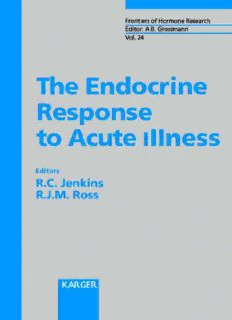
The Endocrine Response to Acute Illness (Frontiers of Hormone Research) PDF
Preview The Endocrine Response to Acute Illness (Frontiers of Hormone Research)
............................ TheEndocrineResponsetoAcuteIllness .. ............................ Frontiers of Hormone Research Vol. 24 Series Editor Ashley B. Grossman, London ............................ The Endocrine Response to Acute Illness Volume Editors Richard C. Jenkins, Sheffield Richard J.M. Ross, Sheffield 33figuresand10tables,1999 ............................ RichardJ.M.Ross,MD,FRCP SeniorLecturerinEndocrinology,DepartmentofMedicine,UniversityofSheffield, NorthernGeneralHospital,Sheffield,UK RichardC.Jenkins,BMedSci,MRCP DepartmentofMedicine,UniversityofSheffield, NorthernGeneralHospital,Sheffield,UK LibraryofCongressCataloging-in-PublicationData Theendocrineresponsetoacuteillness/volumeeditors,RichardC.Jenkins,RichardJ.M.Ross (Frontiersofhormoneresearch;vol.24)Includesbibliographicalreferencesandindex. (hardcover:alk.paper). 1.Endocrinemanifestationsofgeneraldiseases. 2.Endocrineglands–Pathophysiology. 3.Homeostasis. 4.Hormones–Metabolism. I.Jenkins,RichardC. II.Ross,RichardJ.M. III.Series. [DNLM: 1.EndocrineGlands–metabolism. 2.Hormones–metabolism. 3.AcuteDisease. W1FR946Fv.241999/WK102E5551999]RC649.E52251999616.4–dc21DNLM/DLC ISSN0301–3073 ISBN3–8055–6822–3 BibliographicIndices.Thispublicationislistedinbibliographicservices,includingCurrentContentsÔand IndexMedicus. DrugDosage.Theauthorsandthepublisherhaveexertedeveryefforttoensurethatdrugselectionand dosagesetforthinthistextareinaccordwithcurrentrecommendationsandpracticeatthetimeofpublication. However,inviewofongoingresearch,changesingovernmentregulations,andtheconstantflowofinformation relatingtodrugtherapyanddrugreactions,thereaderisurgedtocheckthepackageinsertforeachdrugfor anychangeinindicationsanddosageandforaddedwarningsandprecautions.Thisisparticularlyimportant whentherecommendedagentisanewand/orinfrequentlyemployeddrug. Allrightsreserved.Nopartofthispublicationmaybetranslatedintootherlanguages,reproducedor utilizedinanyformorbyanymeanselectronicormechanical,includingphotocopying,recording,microcopying, orbyanyinformationstorageandretrievalsystem,withoutpermissioninwritingfromthepublisher. ÓCopyright1999byS.KargerAG,P.O.Box,CH–4009Basel(Switzerland) www.karger.com PrintedinSwitzerlandonacid-freepaperbyReinhardtDruck,Basel ISBN3–8055–6822–3 ............................ Contents VII Preface Grossman,A.B.(London) The Endocrine Response to Acute Illness 1 Introduction Jenkins,R.C.;Ross,R.J.M.(Sheffield) 4 Glucose Metabolism Heller,S.R.;Robinson,R.T.C.(Sheffield) 27 Salt and Water Homeostasis Arieff,A.I.(SanFrancisco,Calif.) 67 Calcium Metabolism Lind,L.;Ljunghall,S.(Uppsala) 87 Thyroid Hormones Hennemann,G.;Krenning,E.P.(Rotterdam) 110 The Pituitary Adrenal Axis Newell-Price,J.;Trainer,P.J.(London) 131 The Pituitary Gonadal Axis Fletcher,A.K.(Sheffield) 152 The Regulation of Growth Hormone Secretion Ghigo,E.;Arvat,E.;Gianotti,L.;Maccario,M.;Camanni,F.(Turin) 176 Growth Hormone and IGF-I as Anabolic Therapy Botfield,C.;Hinds,C.J.(London) 201 Subject Index This page intentionally left blank ............................ Preface I am delighted to introduce this new volume on the endocrine responses to acute illness. There is now increasing interest in the pathogenesis and phenomenology of serious critical illness, not least because of the extremely high morbidity and mortality associated with septic shock in critically ill patients,anditsimpactontheutilisationofclinicalresources.Thisisparticu- larly true in patients with multiorgan failure, in whom our apparent under- standing of its pathophysiology has been associated with the increasing use ofsupportivetechniquesfortheheart,lungs,liverandkidney.Inspiteofthis, however,themortalityinsuchpatientsstillremainsextremelyhigh,thereasons for which remain baffling. Research has suggested that agents such as exoge- nous endotoxin and the endogenous cytokines produced in response may be involved in the pathogenesis of disease in such patients, but large-scale trials basedonspecifictherapieshaverecentlyproventobedisappointinglyineffec- tive.Inaddition,large-scaletrialsoftheuseofhigh-dosesteroidsandgrowth hormoneinlargecohortsofsuchpatientshavealsoproventobediscouraging. Thereasonsforthislackofsuccessareunclear,butalmostcertainlyrelateto ourlackofunderstatingofthemolecularpathophysiologyofthechangesseen in critically ill patients. Specifically, unless we can understand in some detail the endocrine and metabolic changes, then any attempt at intervention is unlikely to be successful. Withthisinmind,IamextremelypleasedtowelcomethisvolumebyDrs. JenkinsandRoss,inwhichadistinguishedpanelofinternationalcontributors describeandoverviewthecurrentstudiesontheendocrinechangesincritically illpatients.Iamcertainthatitisonlybyunderstandingsuchchangesindetail, andcomprehendingtheprecisemolecularpathogenesis,canwebegintomake anytherapeuticinroadsintothisdifficultsituation.Astheypointoutintheir Introduction,onceacriticallyillpatienthasmovedintoachronicphase,one cannotnecessarilyarguethatanyofthemetabolicandendocrinechangesare adaptive, as there may have been no substrate on which evolution can act in terms of natural selection. Under such circumstances, it is only by increasing ourunderstandingthateventualtherapeuticimprovementscanbemaintained. This volume is a worthy contribution to this important field. Ashley B. Grossman London, UK Preface VIII ............................ Introduction Criticalillnessisamodernphenomenonresultingfrommedicaladvances which allow the survival of patients who would have previously died. The effects of critical illness are manifold and not least among them are the pro- found changes seen in metabolic and hormonal systems. Some of these pro- cesses are disease specific and others are common to many aetiologies of criticalillness.Thereareanumberofreasonswhyitisimportanttounderstand thesemetabolicprocesses.Firstly,andpotentiallymostimportantly,thisknow- ledge may allow the rational use of pharmaceutical interventions aimed at improving outcome. Secondly, the changes may have prognostic significance whether or not they have a causal role in outcome or are just markers for diseaseseverity.Prognosticrelationshipssuggestthatanumberofthemetabolic changes seen in acute illness may be important in determining outcome. Ithasbeenproposedthatcriticalillnessfallsintotwometabolicallydistinct phases–acuteandchronic[1].Itseemslikelythattheacutephasehasevolved to optimise survival in the face of a temporary non-catastrophic injury or illness. Before modern medicine the organism would have survived or died and it seems unlikely therefore that there would have been pressure for the evolutionofachronicresponse. Thechronicresponseweseetodaymaythus representhumanphysiologyreactingtocircumstanceswhichithasnotevolved todealwithanditsresponsesmaythusbeinappropriateandevendeleterious to survival. Theobviousimplicationofthisreasoningisthatinterventionsthatmodify the endocrine/metabolic response may be beneficial. A number of important studies have attempted to do this and these are discussed in the relevant chapters.Ingeneral,earlysmallstudieshavebeenpromisingbutlargerbetter designed studies, often using a sledgehammer approach, have either shown nobenefitoractualharm.Inthelightofthesefindingsrecentworkhasbegun to suggest that subtle interventions may be of benefit.
Description: